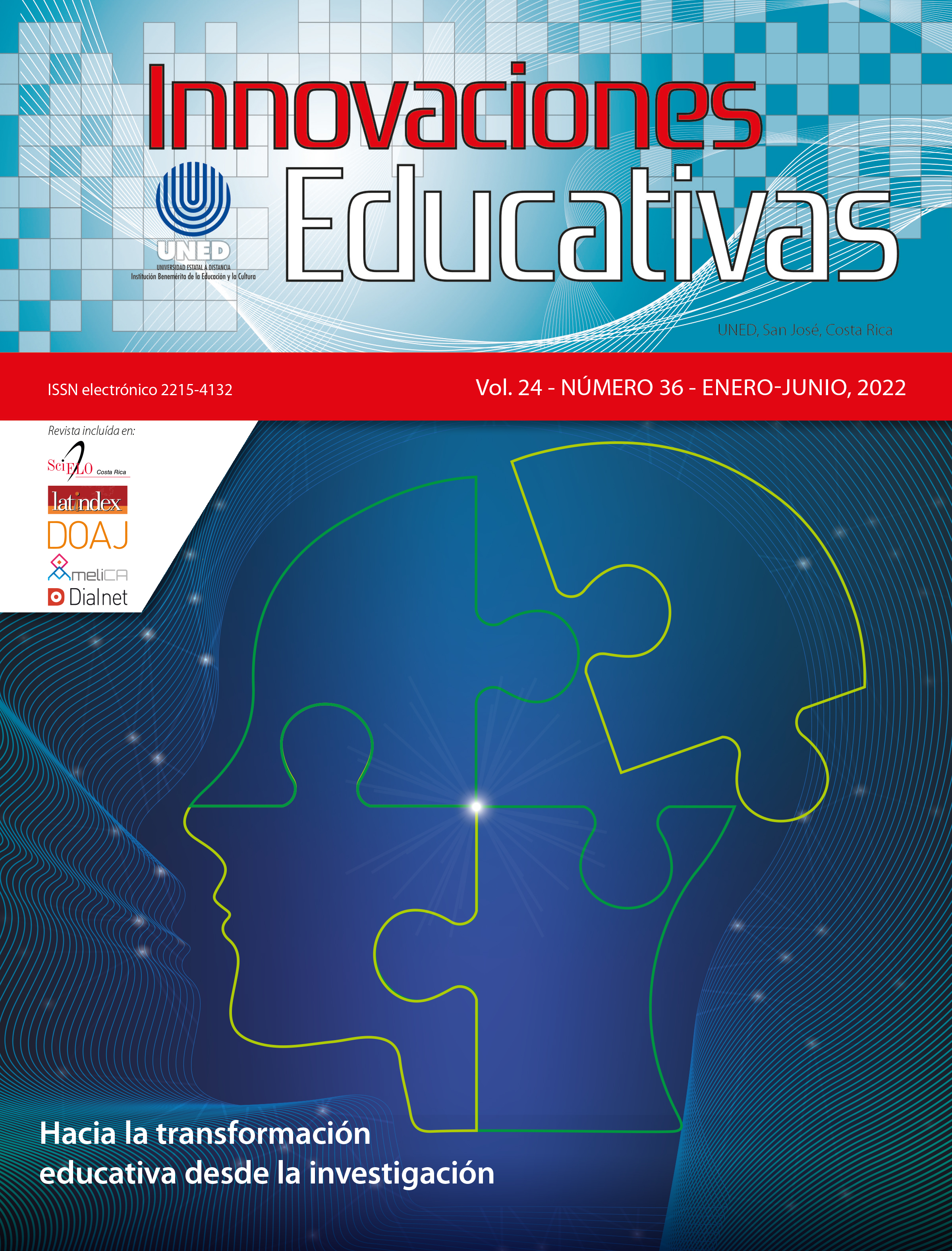English reading pedagogical mediation for language basic level students in the Preschool Education course at UNED, Costa Rica
DOI:
https://doi.org/10.22458/ie.v24i36.3855Keywords:
Learning strategies, linguistic attitudes, expressive language, language skills, second language learning, educationAbstract
The need to develop linguistic competencies in a second language in Costa Rica's early childhood has led state universities to review their curricula for teacher training. This reality and the mediation of materials in English as a requirement for accreditation led to the need to incorporate readings in a second language in the different subjects of the Early Childhood Education Program at UNED, knowing that the population lacks proficiency in this language. The intention of this study was to mediate readings in English using strategies based on tasks and cooperative work for graduate students with a basic command of the language. Both strategies were chosen because they were appropriate for distance learning. The material chosen by experts was a reading and a video, which meet the following requirements: 1- the reading: short (no more than 5 pages), simple vocabulary, and illustrative images. 2- the video: short (no more than 4 minutes) and with English subtitles. The mediation and evaluation of the material were carried out on the platform through prediction activities. The activities evaluated comprehension and listening skills and were presented in an academic forum. It was found that as long as the student population can use all visual, auditory, and prior knowledge resources in the assessment activities, language as such does not represent an obstacle. These results suggest the benefit of the strategy of task work, collaborative work, and predictive activities as techniques to mediate the material in another language.
References
Agencia Colombiana de la Calidad de Educación. (2019). Estrategia de comprensión lectora hacer predicciones. Recuperado de http://archivos.agenciaeducacion.cl/ACE_Estrategia_Hacer_predicciones.pdf
Assmann, H. (2002). Placer y Ternura en la Educación: Hacia una Sociedad Aprendiente. Madrid: Narcea S. A.
Barrantes, R. (2014). Investigación, Un camino al conocimiento, Un Enfoque Cualitativo, Cuantitativo y Mixto. San José, Costa Rica, Editorial EUNED.
Barquero, K. (2019). Mayoría de docentes de inglés en la región con dominio básico, advierten estudio. LaRepublica.Net https;//www.larepublica.net/noticia/mayoría-de-docentes-de-ingles-de-la-region-con-dominio-basico-advierte-estudio
Bolívar, A. (2017). Docencia e investigación en la universidad: de una relación problemática a una productiva. Revista de Gestión de la Innovación en Educación Superior REGIES, 2, p.p.11-33. Issn 0719-742X.; E-Isnn: 0719-7624
Cerdas, D. (2016, 1 diciembre). Solo una cuarta parte de los costarricenses habla inglés. La Nación. Recuperado de https://www.nacion.com/el-pais/educacion/solo-una-cuarta-parte-de-los-costarricenses-habla-ingles/UU726UVRWFFOHPTDTIY53FUUAE/story/
Chick, Nancy. (s.f.). A scholarly approach to teaching. In Scholarship of teaching and learning: A guide from the Vanderbilt University Center for Teaching. Retrieved from https://my.vanderbilt.edu/sotl/understanding-sotl/a-scholarly-approach-to-teaching/.
Chocarro, E.; Sobrino, A & González, M. (2013). Scholarship of Teaching and Learning: Un modelo de desarrollo profesional de los profesores universitarios. Revista Electrónica Interuniversitaria de Formación del Profesorado, 16(1), 5-‐14. DOI: http://dx.doi.org/10.6018/reifop.16.1.179401
EF-EPI. (2019). El ranking mundial más grande según su dominio del inglés. Ef. Com. https://www.ef.com/cl/epi/
García, J. (2016). La enseñanza de la segunda lengua en el aula de Infantil a través de las TIC: propuesta didáctica. (Tesis de Licenciatura) Universidad de Valladolid, España. Recuperado de: https://uvadoc.uva.es/bitstream/10324/18548/1/TFG-O%20749.pdf
Garza, J. (2019). Costa Rica tiene el segundo mejor inglés no nativo de Latinoamérica. LaRepública.Net. https://www.larepublica.net/noticia/costa-rica-tiene-el-segundo-mejor-ingles-no-nativo-de-latinoamerica
González, W. y Garbanzo, P. (2016). Implementación de un programa educativo en Artes Plásticas basado en el Aprendizaje Cooperativo sobre la motivación en estudiantes de secundaria. (Tesis de Licenciatura) Universidad Nacional, Costa Rica.
Rodríguez, N. (2014). Creencias y representaciones de los profesores de lenguas extranjeras sobre la influencia de los factores motivacionales y emocionales en los alumnos y en las alumnas. Recuperado de http://www.ugr.es/~portalin/articulos/PL_numero21/12%20%20Nieves.pdf
Morales, S. (2008). La efectividad de un modelo de aprendizaje combinado para la enseñanza del inglés como lengua extranjera: estudio empírico. Revista de Lingüística Teórica y Aplicada. 95-118. CL ISSN 0033 - 698X
Sabokrouh, F. (2014). The Effect of EFL Teachers’ Attitude toward English Language and English Language Proficiency on Their Sense of Efficacy. Vol. 7, No. 1; ISSN 1916-4742 E-ISSN 1916-4750
Rafieyan, V; Orang, M; Bijami, M; Sharafi, M; Nejad & Lin Siew Eng. (2014). Language Learners’ Acculturation Attitudes. English Language Teaching; Vol. 7, No. 1; ISSN 1916-4742 E-ISSN 1916-4750

